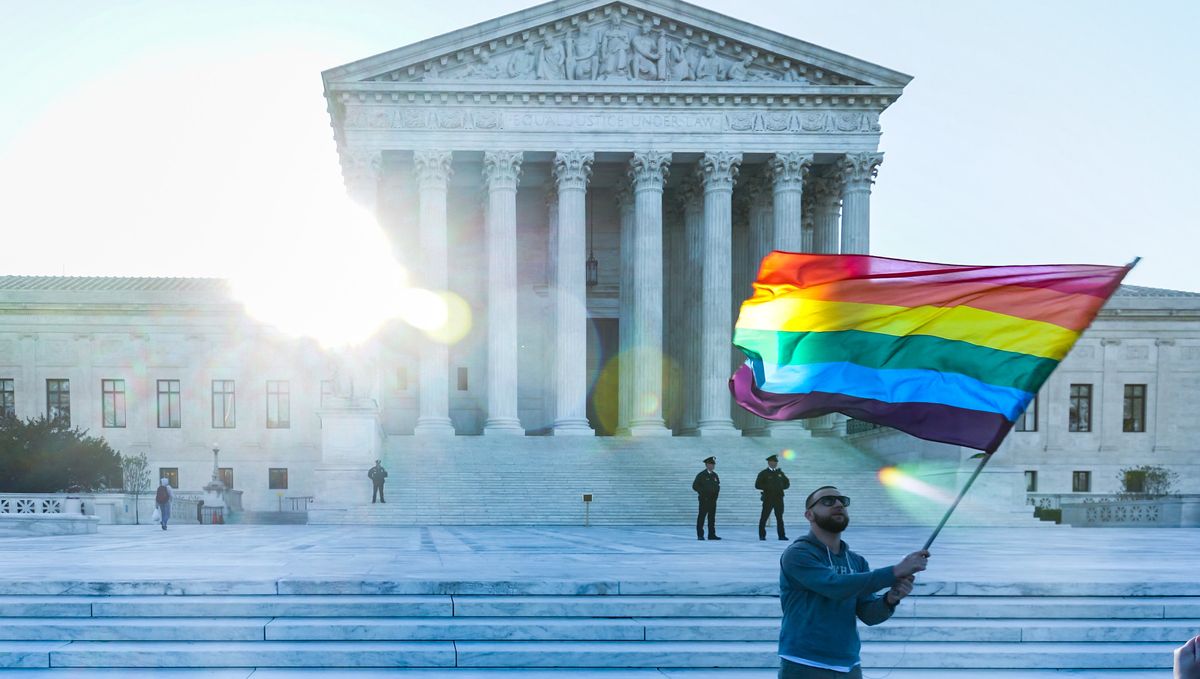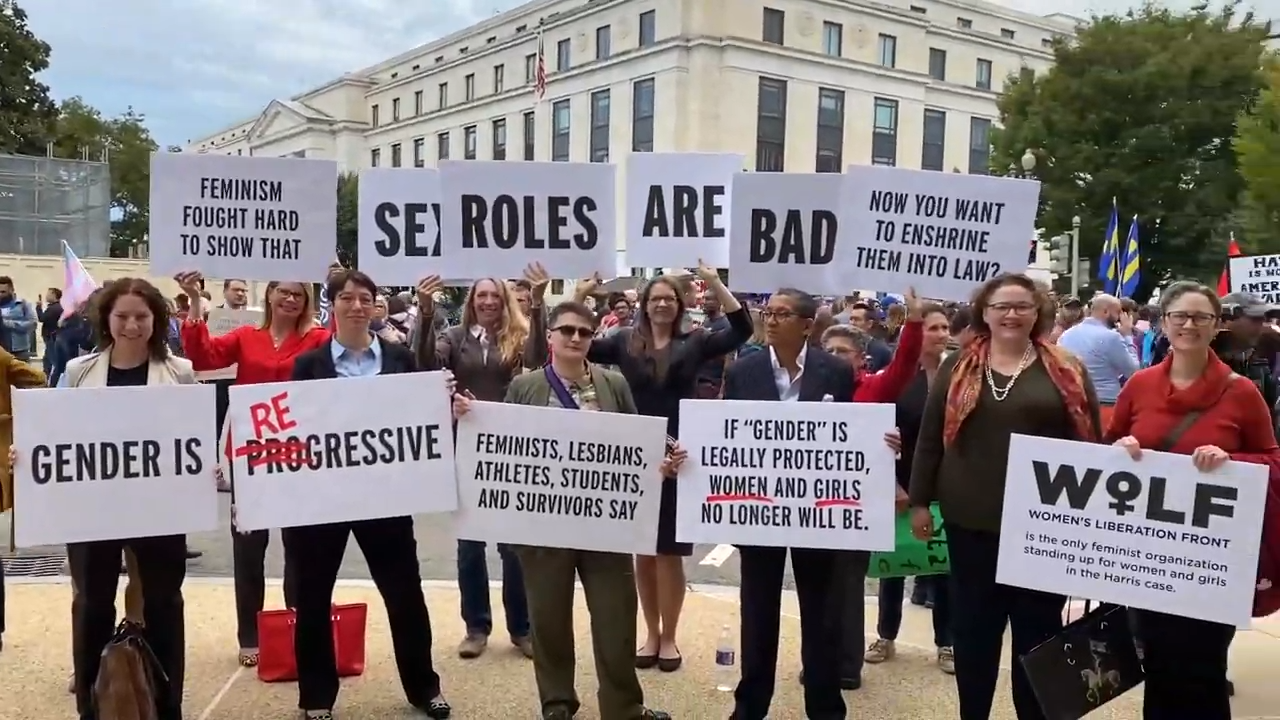SCOTUS Rules LGBT Workplace Discrimination Illegal
The decision is a win for lesbians, but may be more complicated for women as a whole

On Monday, the Supreme Court of the United States ruled on three cases of LGBT discrimination, deciding by a 6-3 majority that in all cases employers had violated the Civil Rights Act of 1964 in firing LGBT employees.
The majority decision was written by conservative Trump-appointee Justice Neil Gorsuch, a move that surprised many LGBT advocates. Gorsuch applied his textualist analysis to the 1964 Civil Rights Act, concluding that discrimination based on homosexuality or transgenderism is inherently discrimination based on sex.
What the 1964 Civil Rights Act says
The ground-breaking Civil Rights Act of 1964 bars discrimination based on sex in many situations. Title VII, specifically, bans sex discrimination in employment practices.
"It shall be an unlawful employment practice for an employer -
(1) to fail or refuse to hire or to discharge any individual, or otherwise to discriminate against any individual with respect to his compensation, terms, conditions, or privileges of employment, because of such individual's race, color, religion, sex, or national origin; or
(2) to limit, segregate, or classify his employees or applicants for employment in any way which would deprive or tend to deprive any individual of employment opportunities or otherwise adversely affect his status as an employee, because of such individual's race, color, religion, sex, or national origin."
Although the Act was initially introduced on the back of the Civil Rights Movement for Black Americans, women like Alice Paul and the National Women's Party advocated for sex to be included in the legislation.
The one-word amendment, "sex," was proposed by Rep. Howard Smith, a Democrat from Virginia. Some have argued that Smith was attempting to derail the Civil Rights Act, since he had previously spoken in opposition to it. Others have suggested his motivation was more nuanced, such as perhaps not wanting white women to get left behind black women. Either way, the amendment and the bill passed, making discrimination because of sex illegal in most circumstances.
The cases in question
Three cases were at the heart of Monday's decision, each focused on a male employee who was fired after revealing he was either gay or identified as transgender.
Case 1: Bostock v Clayton County, Georgia
Gerald Bostock was a child welfare advocate for Clayton County, Georgia. Bostock had led the county for over a decade with excellent results, including national recognition for his work. When Bostock started participating in a gay softball league, powerful members of the community began making disparaging remarks about his sexual orientation. Not long after, he was fired for "conduct unbecoming a county employee."
Case 2: Altitude Express Inc. v Zarda
Donald Zarda was employed as a skydiving instructor at Altitude Express in New York. He worked at the company for several seasons before mentioning he was gay. Only days later, Zarda was fired.
Case 3: Harris Funeral Homes v Equal Employment Opportunity Commission
Aimee Stephens worked at Harris funeral home for six years. Stephens was fired after writing a letter to management stating his intention to "live and work full-time as a woman."
Harris and Zarda have both passed away since the instigation of their cases, which have been continued by their estates.
In each of these cases, the employers have been straightforward on the reason for the employee's termination. They do not contest that it was due to the employee's status as either gay or transgender. However, the employers argued, this was not discrimination based on sex.
The court was clear that the questions addressed in these cases were limited in scope only to firing based on homosexual and transgender status.
"Under Title VII, too, we do not purport to address bathrooms, locker rooms, or anything else of the kind. The only question before us is whether an employer who fires someone simply for being homosexual or transgender has discharged or otherwise discriminated against that individual “because of such individual’s sex.”"
Majority decision logic
The majority decision states that firing an employee based on homosexuality or transgender identity is discrimination based on sex. This decision is based on the logic that homosexuality and transgenderism are intrinsically tied to the individual's biological sex, and can not be removed from sex.
The decision did not redefine "sex" to mean "gender identity." Rather, the cases (including Stephens') are entirely based on the biological reality of sex. Without acknowledging his sex as male, Stephens would not have a case of discrimination based on sex. Gorsuch is explicit in this:
"We proceed on the assumption that 'sex' signified what the employers suggest, referring only to biological distinctions between male and female."
Sex, they argue, is the "but-for cause" in discrimination based on LGBT status, stating, "It is impossible to discriminate against a person for being homosexual or transgender without discriminating against that individual based on sex." The majority argued that if a man is permitted by a company to be sexually attracted to women, then women must also be permitted the same. Otherwise, sex is the deciding factor.
"Imagine an employer who has a policy of firing any employee known to be homosexual. The employer hosts an office holiday party and invites employees to bring their spouses. A model employee arrives and introduces a manager to Susan, the employee’s wife. Will that employee be fired? If the policy works as the employer intends, the answer depends entirely on whether the model employee is a man or a woman."
In response to criticism that it is possible to discriminate against a potential hire without knowing their sex simply because they are homosexual or transgender, the court argued:
"There is no way for an applicant to decide whether to check the homosexual or transgender box without considering sex. To see why, imagine an applicant doesn’t know what the words homosexual or transgender mean. Then try writing out instructions for who should check the box without using the words man, woman, or sex (or some synonym). It can’t be done."
In this instance, the court again confirmed the material reality of biological sex and its impact on sexual orientation.
Since it is impossible to discriminate against homosexuality or transgenderism without also considering sex, the court considered employment discrimination based on either illegal under Title VII of the Civil Rights Act.
You can read the full text of the decision here.
Dissenting opinion rebuttal
Justice Samuel Alito wrote the dissenting opinion, which harshly criticizes the court for "usurping the constitutional authority of other branches."
"There is only one word for what the Court has done today: legislation."
Alito criticized Gorsuch for claiming to rely on a textualist interpretation of the law, with which he claimed late Justice and hard-core textualist, Antonin Scalia, would disagree.
"Many will applaud today’s decision because they agree on policy grounds with the Court’s updating of Title VII. But the question in these cases is not whether discrimination because of sexual orientation or gender identity should be outlawed. The question is whether Congress did that in 1964. It indisputably did not."
Alito compares sexual orientation or identifying as transgender to stealing company property, arguing that if an employee is fired for misconduct, "that action is not converted into sex discrimination simply because the employer knows the employee’s sex."
The dissent also argues that the majority is wrong in stating that any discrimination simply "related to" sex is banned under the Civil Rights Act:
"Title VII prohibits discrimination because of sex itself, not everything that is related to, based on, or defined with reference to, “sex.” Many things are related to sex. Think of all the nouns other than “orientation” that are commonly modified by the adjective “sexual.” Some examples yielded by a quick computer search are “sexual harassment,” “sexual assault, “sexual violence,” “sexual intercourse,” and “sexual content.” Does the Court really think that Title VII prohibits discrimination on all these grounds? Is it unlawful for an employer to refuse to hire an employee with a record of sexual harassment in prior jobs? Or a record of sexual assault or violence?"

Impact on women's rights
Although all of the employees in these three cases were male, the decision will certainly impact many women. Lesbian and bisexual women still face discrimination in the workplace, especially in hiring practices. This ruling will now make that discrimination illegal.
Females also make up an increasingly growing proportion of trans-identifying individuals, so rights that protect transgender people from discrimination are important to a growing swath of the female population (regardless of how they choose to identify).
Still, some feminists are concerned that the ruling may have unintended consequences for women's rights, especially the right to sex-segregated spaces which have traditionally existed for the safety or benefit of women and girls.
The Women's Liberation Front (WoLF) has stated that while they agree with the court's assessment that discrimination based on sexual orientation is sex-based discrimination, the ruling on Stephens' case sets a dangerous precedent for women's rights.
In a statement on Facebook, WoLF wrote:
"To be clear, the Court gets it right when it says that sexual orientation does not, and should not, relate to a person's employment status or performance, and that discrimination on the basis of sexual orientation constitutes unlawful sex discrimination. But the Court gets it gravely wrong when it conflates sexual orientation and so-called "gender identity."
This decision is a terrible one for all women and girls, including lesbians and bisexual women. We are gravely concerned about the impact that this decision almost certainly will have on the application of Title IX, specifically the ability to exclude males from women's sports, and the ability of female athletes to keep men and boys out of our intimate spaces. We are also gravely concerned about what this will mean for the ability of women and girls to keep men out of spaces like prisons and shelters."
Feminist activists fear that the court was not explicit in protecting sex-based rights, such as bona fide occupational requirements - an exception to the Civil Rights Act that allows sex to be taken into account when it is relevant to the job at hand (such as, for example, in a rape crisis center). The bona fide occupational requirement exception was not referenced by the Court.
Although the ruling explicitly does not address other situations such as bathrooms or shelters, WoLF argues the case will set the precedent that men must be treated as women under the law based solely on the undefined concept of "gender identity."
Despite the fact that Stephens' case relies entirely on him being male and acknowledgment of his biological sex was necessary to determine sex discrimination, feminists have criticized the court for using female pronouns and honorifics to refer to Stephens throughout the ruling, essentially codifying the fiction that he is female despite the actual text of the ruling. This sort of language obfuscates the reality that women face.
WoLF has also argued that, had Stephens wished to challenge sex-specific dress codes, this could have been accomplished by challenging the legality of the dress codes themselves rather than relying on gender identity.
Alito's dissent backs the concerns of feminist groups like WoLF. In the dissent, he argued that the impact of the ruling on Title VII could be felt across a variety of realms, including women's sports:
"Under the Court’s holding that Title VII prohibits employment discrimination because of transgender status, an athlete who has the physique of a man but identifies as a woman could claim the right to play on a women’s professional sports team. The owners of the team might try to claim that biological sex is a bona fide occupational qualification (BFOQ) under 42 U. S. C. §2000e–2(e), but the BFOQ exception has been read very narrowly."
Feminists are concerned that while the text of the ruling is rooted in biological and material reality, the subtext is less straightforward.
"Six members of the U.S. Supreme Court think that men can be women," WoLF stated, "This is a dark day for women and girls in the U.S."
The generous support of our readers allows 4W to pay our all-female staff and over 50 writers across the globe for original articles and reporting you can’t find anywhere else. Like our work? Become a monthly donor!
Enter your email below to sign in or become a 4W member and join the conversation.
(Already did this? Try refreshing the page!)




Comments